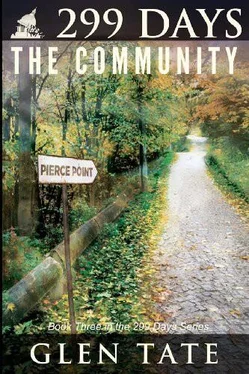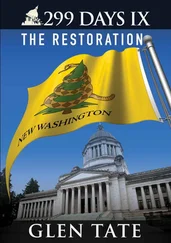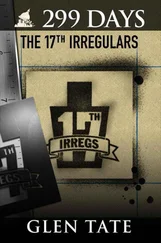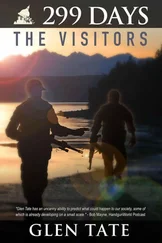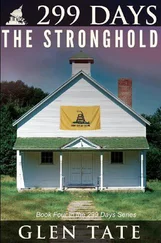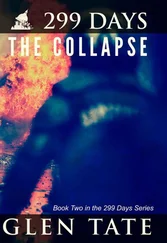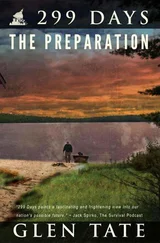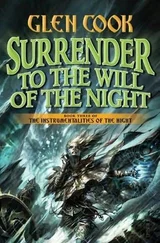Rich Gentry was making full use of the terrain he had been given. He had a half dozen well-armed and organized men. His hardest task was administrative: keeping track of who lived there and who their guests were.
As Mark’s convoy approached, Rich went up to greet them. He recognized Mark’s truck and the others in his group, but he checked them out in person, just to be sure.
“Hey, Mark, how were things in town?” Rich asked, knowing that all the other guards and everyone else would be interested in the answer. Rumors were flying like crazy. Who had gas and what things cost was a topic of constant conversation.
“Slippin’ a little,” Mark said. He described the surcharge and $200 limit at the grocery store and that gas was now $15 a gallon. He described the limits on ammunition. He didn’t mention the Mexican grocery thing since, technically, brandishing a rifle like that was illegal. Why tell an ex-cop that your friend just committed a crime?
“You have any additional riders from when you left?” Rich asked.
“Nope,” Mark said, glad that Rich was thinking of things like that.
“There’s a meeting tonight at 7:00 at the old Grange hall,” Rich said. The Grange was a farmers’ association that saw its heyday in the 1950s. They had buildings for meetings throughout much of rural America, especially in the West. Most of them were pretty rundown, since few Granges still met. They had a cinderblock building painted white in the middle of Pierce Point. The tiny Pierce Point Church rented it on Sundays, which is how the Grange paid the utilities. The building was run down, but always had a fresh coat of paint on it and was clean. A few elderly farm families took great pride in their Grange hall.
“I’m not a homeowners’ association kind of guy,” Mark said. “What’s the meeting about?” As if he didn’t know.
“Security,” Rich said. “We want to get some guards and patrol volunteers together. You and,” Rich pointed to the trucks driven by the Team, “your young friends are welcome. Bring John, too.”
Rich noticed the CBs they had. Those would be extremely handy to have. Rich was initially surprised that the authorities were allowing CBs to operate. There were probably all kinds of protests being planned with CBs and every other means of communication.
Rich, who was an active Oath Keeper, knew that CBs would eventually be used by the Patriots. Why wouldn’t the government jam the CBs? Then Rich realized that the truckers needed CBs, and the authorities needed the truckers. CBs meant supplies got to where they needed to be, and preventing the unrest that came from the population not having supplies was more important to the government than preventing people from communicating for anti-government purposes.
“See you at 7:00,” Mark said. He was glad that an old Marine like him could help out. He was really glad the Team was out there. He thought how much better they were squared away than the people in Frederickson, let alone what Olympia must be like. He didn’t even want to think about Seattle.
Rich waved them through, but he still looked into the trucks as they went by. He noticed the chicks and chickens Mary Anne had. Someone thought this little crisis was going to last for a while, he thought.
They pulled up to the Over Road guard shack. Paul was there with a shotgun and Chip had an AR. They waved them in. Everyone parked and started unloading the goods. They were telling everyone the stories and describing what they got. The chicks and chickens got the most attention. John started planning to build a coop.
Grant was disappointed that they only got $200 worth of groceries, and no staples, although, the jam and syrup would come in handy for the biscuit and pancake mix they had. Calories were calories. That was funny, Grant thought. He was thinking of food as calories now.
There was a smell; a BBQ. Chip had started it up around noon. Paul got some frozen salmon out and they were ready to cook it up. Everyone was hungry, especially the milk run crew. They realized that all the stress suppressed their appetites, but when the stressful event was over, their appetites quickly returned.
They ate and planned out what to do that afternoon. They would build a coop and inventory each household’s supplies. People were taking guard duty without being told; it was just something they instinctively knew to do. Everyone would meet back for dinner at 6:00 p.m. and then go to the meeting at the Grange.
Cole was the only one without any chores. He was enjoying it out at the cabin. His whole family was there and his sister was taking care of him. No school. That was the best part. He was in regular classes, but school was hard for him. All those people talking to him and making him talk. He wanted the quiet and to only be around people who knew him.
Grant realized that Cole also had to work, even though he had a disability. It would be good for him and everyone else would appreciate that Grant’s son wasn’t getting any unfair breaks.
“Come here, little buddy,” Grant said to Cole. Grant motioned for Manda to come over and join them.
“Yeah, Dad,” Cole said.
“We all have jobs out at the cabin. What could be a job for you, Cole?”
“Playing?” Cole said with a smile. He wasn’t dumb. He just couldn’t talk too well.
“Nice try.” Grant looked around. There were pinecones all around. They would burn nicely. It was May now, but would be cold in a while. They would need things to burn. “You can pick up pine cones. I’ll show you where to put them. We can use them to burn for heat in the winter.”
Cole nodded. He was happy to have a job.
“One thing, though,” Grant said. “You can’t leave the gravel road. You can’t go past the guard shack,” Grant said, pointing to the shack, “without your sister or one of us grownups. Got it?”
Cole nodded. It was so much easier to nod than to talk.
“OK, pal,” Grant said. “You can do a little bit of pinecones every day. You can still play, but just not all the time. Once the pinecones are done, we’ll have you do other things.” Grant thought about Cole gathering up all those apples that just fell onto the ground in the late summer. That was past the guard shack, but Manda could go with him. Armed, of course.
Cole would be the little gatherer. He could also run messages throughout the Over Road cabins. He couldn’t relay messages because his verbal skills were so low, but he could tell people to come to a certain cabin and talk to someone, or he could deliver a note. That kind of thing. Cole and Manda would also make beds, clean bathrooms, sweep, dust, and vacuum. They would set the table, wash dishes, and cook some meals themselves. They would also cut and stack firewood. They would assist with canning and dehydrating food.
Grant realized that Cole and Manda, the upper middle class suburban kids, didn’t really have any chores back at home. They sure would out there. It would be good for them. And it would be a real help to the grownups. The kids were open to doing chores. They both realized that their help was needed.
One thing the grown-ups would need to talk about was school for the kids. Abstract learning—calculus, comparative literature—would have to wait a future time. At least they wouldn’t be wasting their time with what passed for history before the Collapse. Grant had called it “Anti-American Studies.” It was pure indoctrination with no educational value. Out here, with no school and probably no internet or text books, they could maintain what the kids already knew with refreshers on the basics. Luckily, a year ago Grant had picked up an encyclopedia set for next to nothing. That had tons of great knowledge in it and it made for interesting reading for grown-ups when there was nothing else to do.
Читать дальше
